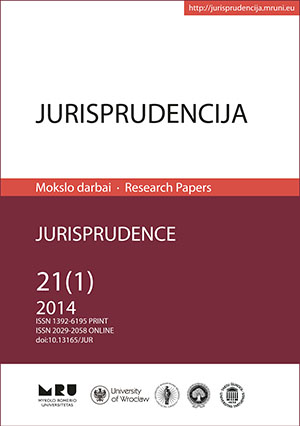Viešojo intereso nustatymas – objektyvieji kriterijai
Determination of Public Interest – Objective Criteria
Author(s): Evaldas Klimas, Julius LankelisSubject(s): Law, Constitution, Jurisprudence
Published by: Mykolas Romeris University
Keywords: public interest doctrines; objective criteria of public interest concept; quantitative objective criteria; qualitative objective criteria
Summary/Abstract: The aim of this article is to identify objective criteria for the determination of public interest concept in the case-law of the Republic of Lithuania. Legal practice and legal doctrine universally agree that there are lot of difficulties defining the concept of public interest. The authors of this study explored that neither statutory law nor case law practice or legal doctrine are able to serve general public interest definition. Despite this fact, the authors tried to determine basic legal objective criteria in order to establish whether the public interest could be established and defended in a particular case. The article is divided into two main parts. The comparative doctrine and case law analysis of public interest concept is given in the first part. The second part includes studies of the precedents of court judgments, where legal objective criteria are identified. The authors established ten basic legal objectives criteria, which may be quantitative and qualitative. In addition, supplementary objective criteria are also crystallised. This study provides objective legal criteria to identify public interest. These legal objective criteria may serve as a methodical measure for all lawyers to propose a wellreasoned legal conclusion whether the public interest in a particular case exists or not. Firstly, the objective criteria should be determined. Only after that, the algorithm of qualitative objective criteria should be applied. These qualitative objective criteria are the following: was there made the breach of the main constitutional principles; was there determined the fault of subjects; does the breach constitute mightily negative legal consequences; is the defence of public interest still relevant; what are the terms of the limitation period; what were the actions of infringer before, during and after the breach of law; evaluation of the principle of proportionality; dissociation of the subjective right and interest, protected by the law; evaluation of ordinary tests. Additional criteria may also be applied if it is requested in specific legal relationships, e.g., were there implemented the main principles of proper public administration, etc. Documents analysis and systemic methods were applied during the research. The analysis was supported by teleological and comparative methods.
Journal: Jurisprudencija
- Issue Year: 21/2014
- Issue No: 1
- Page Range: 115–140
- Page Count: 26
- Language: Lithuanian

